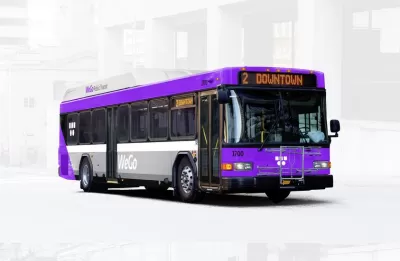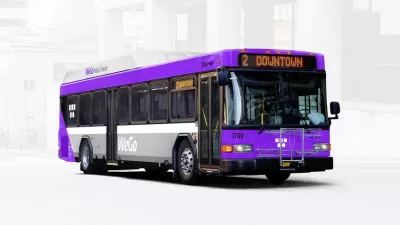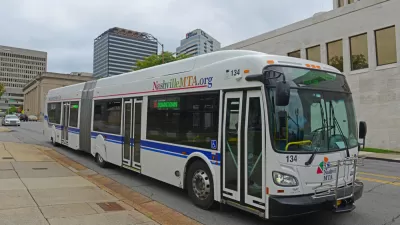Last spring, voters resoundingly quashed Let's Move Nashville, a $5.4 billion plan to build out the city's transit options. The plan paid too little attention to current riders, advocates say, and they aim to do things differently.

Former Nashville Mayor Megan Barry resigned amidst scandal last year, and with her went Let's Move Nashville, a transportation package that voters rejected by a 64% to 34% margin. TransitCenter calls the vote "a stunning defeat for a plan that consistently polled well and enjoyed support from the Chamber of Commerce and dozens of business and civic organizations." But as critics tell it, Let's Move Nashville suffered from major flaws besides its association with the former mayor.
For one thing, TransitCenter reports, "with 80 percent of the funds earmarked for building five light rail corridors and a tunnel through downtown, a relatively small percentage was left over for bus and pedestrian improvements"—the kinds of projects current transit riders actually want. Some associated the plan with an overeager appetite for transit-oriented development, stoking gentrification fears.
In the year since, "transit supporters regrouped, determined to grapple with what went wrong and learn from past mistakes. A year after the vote, a new coalition is reviving the transit conversation in Nashville." They include the advocacy groups behind the Nashville Community Transportation Platform and a broad coalition including business groups called Connect Mid TN.
The new coalition wants to place greater emphasis on community engagement, which they say was definitively lacking last time. But they may have to contend with lackluster backing from city leaders like Mayor David Briley, "whose support for transit is lukewarm at best."
FULL STORY: Nashville Emerges From the Transit Ashes

Planetizen Federal Action Tracker
A weekly monitor of how Trump’s orders and actions are impacting planners and planning in America.

Map: Where Senate Republicans Want to Sell Your Public Lands
For public land advocates, the Senate Republicans’ proposal to sell millions of acres of public land in the West is “the biggest fight of their careers.”

Restaurant Patios Were a Pandemic Win — Why Were They so Hard to Keep?
Social distancing requirements and changes in travel patterns prompted cities to pilot new uses for street and sidewalk space. Then it got complicated.

Platform Pilsner: Vancouver Transit Agency Releases... a Beer?
TransLink will receive a portion of every sale of the four-pack.

Toronto Weighs Cheaper Transit, Parking Hikes for Major Events
Special event rates would take effect during large festivals, sports games and concerts to ‘discourage driving, manage congestion and free up space for transit.”

Berlin to Consider Car-Free Zone Larger Than Manhattan
The area bound by the 22-mile Ringbahn would still allow 12 uses of a private automobile per year per person, and several other exemptions.
Urban Design for Planners 1: Software Tools
This six-course series explores essential urban design concepts using open source software and equips planners with the tools they need to participate fully in the urban design process.
Planning for Universal Design
Learn the tools for implementing Universal Design in planning regulations.
Heyer Gruel & Associates PA
JM Goldson LLC
Custer County Colorado
City of Camden Redevelopment Agency
City of Astoria
Transportation Research & Education Center (TREC) at Portland State University
Camden Redevelopment Agency
City of Claremont
Municipality of Princeton (NJ)





























